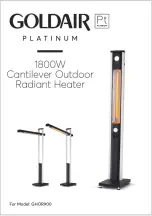
37405-0-0616
Page 8
Figure 6
Electrode and pilot must be kept clean. Clean through pilot
access hole with a small brush (toothbrush) and water.
Proper Main Burner Flame
The correct flame will be a short blue inner flame with a much
larger light blue outer flame. The main burner (Figure 7) shows
the approximate height of each part of the flame for each gas. The
burner does not have a primary air adjustment. The flame will be
correct if the factory-set pressure and orifice opening are used. After
the furnace has been operating, the burner ports may be blocked
by foreign matter carried in by combustion air. Therefore, cleaning
of the burner may be needed for proper flame.
To clean burner port disconnect the gas supply to the valve, and
remove the eight screws fastening the burner door. After removing the
burner door from the combustion chamber, remove rear burner, pilot
burner and front burner. With front and rear burners removed from
furnace, force water into the ribbon ports and dry with air pressure.
4” (102mm) NAT
6” (152mm) LP
1 ½”(38mm) NAT
1/4” (6mm) LP
Figure 7
Replacing Fan and Oiling the Motor
The fan motor should be cleaned and oiled once each heating season.
To reach the motor, withdraw the metal shroud surrounding the fan
blade by removing the screws on each side. Oil holes are located
on the top at each end of the motor. Use a few drops of #10 motor
oil. To clean the motor, blow air through its ventilation openings
with a vacuum cleaner or low pressure air source.
If fan motor is replaced, the silicone rubber gaskets, see page 14,
Index No. 5, Part No. 712059 should also be replaced. The gaskets
must be stretched to fit the motor bolts into the gasket holes and
then the motor and gaskets installed on the motor mounting bars.
Checking Manifold Pressure
Both Propane and Natural gas valves have a built-in pressure
regulator in the gas valve. Natural gas models will have a manifold
pressure of approximately 3.5” w.c. (.871kPa) at the valve outlet
with the inlet pressure to the valve from a minimum of 5.0” w.c.
(1.24kPa) for the purpose of input adjustment to a maximum of
10.5” w.c. (2.615kPa) Propane gas models will have a manifold
pressure approximately 10.0” w.c. (2.49kPa) at the valve outlet
with the inlet pressure to the valve from a minimum of 11.0” w.c.
(2.739kPa) for the purpose of input adjustment to a maximum of
13.0” w.c. (3.237kPa).
A 1/8” (3mm) N.P.T. plugged tapping, accessible for test gauge
connection, is located on the outlet side of the gas control.
The built-in regulator comes on at approximately 1/4th pressure
and full on in 10 seconds.
Figure 5
High Altitudes
For altitudes/elevations above 2,000 feet (610m), input ratings
should be reduced at the rate of 4 percent for each 1,000 feet (305m)
above sea level.
Canadian High Altitudes
for locations having
an elevation above mean sea level between 2,000 feet (610m)
and 4,500 feet (1370m), the manifold pressure is to be decreased
from 3.5” w.c. (.871kPa) to 2.8” w.c. (.697kPa) for Natural Gas and
from 10.0” w.c. (2.49kPa) to 8.0” w.c. (1.992kPa) for Propane Gas.
Proper Pilot Flame
The pilot flame (Figure 6) going to the spark must be large enough
to completely cover the sparking area. With the proper flame, only
2 or 3 sparks will occur. More sparks indicate a small pilot flame
and no ignition with spark stopping after approximately 90 seconds
generally means not enough flame.
To adjust pilot flame remove the pilot cover screw on the control
valve (Figure 5), and turn the adjustment screw clockwise to reduce
flame. Replace pilot cover screw to eliminate gas leakage.
The pilot flame will appear large. A blue nearly horizontal flame
is proper. The spark gap must be 1/8” (3mm) . A larger gap can
result in the spark occurring some other place. The pilot flame and
the spark gap are factory checked and tested.
After use, cleaning may be required for the proper flame.
Safety Lockout
S8600H module provides 100 percent shutoff, or safety
lockout. If the pilot fails to light within 90 seconds, the
control system will shut down. The control system must be
reset by turning off the power to the module for one minute.
INSTALLATION









































